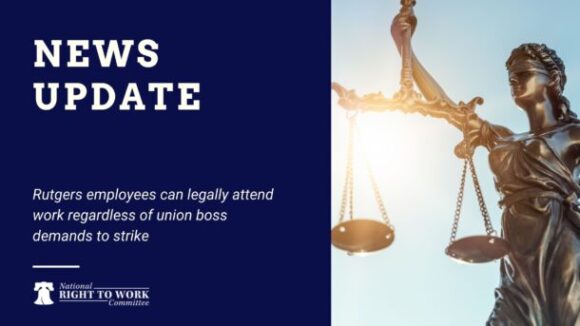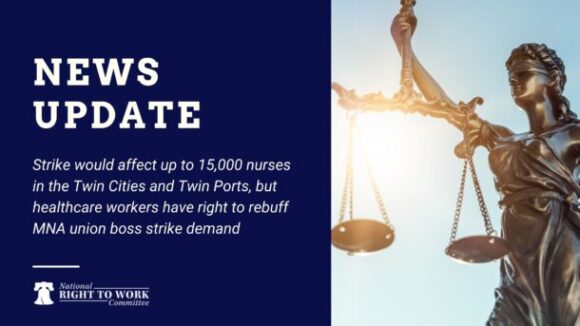Foundation Issues Special Legal Notice to Rutgers Professors Impacted by Union Officials’ Strike Order
Rutgers employees can legally attend work regardless of union boss demands to strike
Even President Obama now admits that American taxpayers lost a total of $15 billion as a result of the 2008-2009 bailouts of union boss-controlled General Motors (GM) and Chrysler implemented by his administration and that of his predecessor, George W. Bush.
But the direct financial cost of the bailouts of the two corporations and the United Auto Workers (UAW/AFL-CIO) hierarchy, even though it is surely far higher than what Mr. Obama acknowledges, represents only a small fraction of the price America is paying as a consequence of his administration’s decision to rig federal bankruptcy rules at Big Labor’s behest.
The primary beneficiaries of the bailout were the very union officials who had wielded their government-granted monopoly-bargaining power to impose wasteful work rules and unsustainable pension and health-benefit schemes that were largely responsible for driving GM and Chrysler into bankruptcy. These union bosses certainly didn’t deserve kid-gloves treatment. Yet that’s what they got.
For example, as Heritage Foundation analyst James Sherk reminded his readers in a December 2013 column for Bloomberg, while GM’s bondholders “recovered less than 30 cents on the dollar,” the UAW hierarchy “recovered most of the money owed its retiree health trusts.” And at Chrysler, UAW bigwigs “recovered a greater proportion” of their unsecured debt “than even secured creditors did.”
In a new column for USA Today, Shikha Dalmia of the Reason Foundation focuses on yet another set of victims of the Obama Administration’s politically motivated bankruptcy reorganization of GM: owners of the 1.6 million vehicles with faulty ignitions that the company has recalled since February. (See the link below to read the entire column.)
In short, the right of GM owners of vehicles with faulty ignitions that caused accidents to collect damages “has been signed away” if the accident occurred prior to the 2009 reorganization. This is true even though the company knew about the problem roughly a decade ago, but delayed recalling the vehicles until very recently. Dalmia explains why:
GM knew there was a problem with the cars, now linked to at least 31 crashes and a dozen deaths, before the launch of the 2005 Chevy Cobalt. An accidental bump could push its key into the “accessory” or “off” position, shutting down the moving vehicle and preventing its air bag from deploying as it crashed.
But GM ignored the problem and put the Cobalt on the road — followed by six other models sharing a similar design — because of the “lead time, cost and effectiveness” involved in any redesign, according to a timeline GM submitted to the National Highway Transportation Safety Administration (NHTSA). . . .
Within a year after Cobalt hit the road, field reports about crashes started surfacing. GM’s legal department opened a file on a victim whose airbags failed to deploy in 2005, but it didn’t inform GM’s safety engineers or NHTSA until two years later. The file was opened four years before the bankruptcy reorganization. . . .
Owners of the recalled cars, along with the families of two teenagers killed in a 2006 Cobalt crash in Wisconsin, filed a class-action lawsuit last week seeking $6 billion to $10 billion in damages for GM’s alleged negligence. But GM enjoys legal immunity from all incidents before its 2009 restructuring.
A liability shield isn’t unusual in bankruptcy cases, but what is unusual is that GM and Chrysler, which also filed for bankruptcy protection, weren’t required to put money in special trust funds for prospective victims. Instead, the corporate giants can treat injured customers as shabbily as unsecured creditors. What little compensation that is available will come from the sale of closed GM plants being held in a shell corporation.
Victims might still potentially receive substantial compensation if they can prove GM executives knowingly withheld information from the Obama Administration in order to get immunity from liability for product defects. But if it turns out that the Obama Treasury knew full well about the faulty ignitions in 2009, as the NHTSA clearly already did, then the victims of GM’s negligence will be left out in the cold.
National Right to Work Committee members and other freedom-loving Americans were publicly opposing to the UAW/GM/Chrysler bailout even before the Obama Administration took office, but few have realized up to now the extent of the disaster. To forestall future costly political interventions in the bankruptcy process, Americans need to hold politicians who instigated or colluded in the scheme fully accountable, regardless of their party affiliation.

Rutgers employees can legally attend work regardless of union boss demands to strike

Big Labor's Evasion of Liability for Property Damage and the Foundation's SCOTUS Amicus brief in Glacier Northwest.

Strike would affect up to 15,000 nurses in the Twin Cities and Twin Ports, but healthcare workers have right to rebuff MNA union boss strike demand